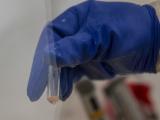May 11, 2006 (CIDRAP News) – VaxGen Inc., maker of a new anthrax vaccine for the US civilian stockpile, announced yesterday that delivery of the first doses will be delayed at least a year beyond the original target date of November 2006.
The Brisbane, Calif., company cited new government-imposed requirements as factors in the delay. The announcement came a few weeks after a newspaper report that testing last year had shown the vaccine was unstable, slowing the project. The company said at the time the problem had already been corrected.
The announcement also came a day after the Government Accountability Office (GAO), Congress's investigative arm, said the government's contract with VaxGen is too rigid and imposes a heavy financial burden on the company.
The Department of Health and Human Services (HHS) awarded VaxGen an $877.5 million contract in November 2004 to make 75 million doses of anthrax vaccine for the civilian stockpile. The company was supposed to deliver the first 25 million doses within 2 years. The contract was the first awarded under Project BioShield, the $5.6 billion program to develop medical defenses against chemical, biological, and radiological weapons.
VaxGen announced yesterday that HHS had extended the contract deadlines while requiring more testing of the vaccine before it can be shipped. "The company estimates that meeting the new requirements will delay the initiation of deliveries to the stockpile to the end of 2007 at best and more likely into 2008," VaxGen stated in a news release. It said the modified contract requires the first deliveries no later than November 2008.
The company will not be paid until the vaccine is delivered. The firm said the contract changes will increase its costs, and the time needed for the additional studies means the company will have to wait longer to get paid.
"Financing an increased scope of work and delays imposed without compensation is the greatest challenge we have faced" in the 4-year project, VaxGen President Lance K. Gordon, PhD, said in the news release.
He said the company has asked HHS to reconsider the contract changes or pay compensation for them. The firm is also pursuing compensation under federal regulations and studying possible legal action, he added.
The VaxGen vaccine, which is not yet licensed by the Food and Drug Administration, uses a recombinant form of an anthrax protein called protective antigen (rPA) as its active ingredient. An older, licensed vaccine, called Anthrax Vaccine Adsorbed (AVA), is made from whole anthrax microbes and thus contains a mixture of things besides protective antigen.
AVA is used in the US military, and HHS has bought 10 million doses for civilians. It has caused controversy in the military because of concern about side effects. The expectation is that the new vaccine will cause fewer side effects and will yield full protection in three doses, instead of the six doses required for the older vaccine.
In March, the Washington Post reported that a human trial of the new vaccine last year had revealed a problem with its potency. The company eventually determined that the vaccine was unstable and lost its strength within a few months.
In a Mar 17 news release, VaxGen officials said the problem was that the active ingredient, rPA, reacted with aluminum hydroxide, an adjuvant (immune-boosting substance) in the vaccine. They said they had experimented with some different formulations and believed they had the problem fixed.
The Post report raised questions about VaxGen's ability to survive long enough to fulfill the vaccine contract, given the company's relatively small size, the structure of the contract, and the problems that can arise in producing new biotechnology products.
Earlier this week, the GAO raised concerns about the VaxGen contract and suggested that if the company can't fulfill it, other biotechnology companies will be less likely to pursue Project BioShield contracts.
In a statement to the House Government Reform Subcommittee on National Security, Emerging Threats, and International Relations, the GAO's Keith Rhodes said, "While developing vaccine is known to be difficult and highly likely to encounter testing and production issues, . . . early development work to ensure the safety of the vaccine and a solid large-scale manufacturing capability had not been completed before awarding the full procurement contract."
He added that the contract leaves little or no room for schedule "slippage" and provides no financial cushion for the contractor in case of delays. Contractors that lack the resources to weather such difficulties "will not be able to meet the contract requirements, thus limiting the pool of companies" that will pursue similar biodefense projects.
A summary of the Rhodes's testimony concludes, "The biotechnology industry is watching to see if government and industry can make this partnership work."
The additional studies that HHS wants VaxGen to conduct include an animal test of the vaccine's efficacy against inhalational anthrax and a phase 2 clinical trial, according to the company. Both trials must use vaccine produced in a way that meets FDA standards for licensed vaccines. Such trials have been done before, but not with a "validated final product," the company said.
See also:
May 9 GAO testimony on anthrax program (full text)
http://www.gao.gov/new.items/d06756t.pdf
Nov 4, 2004, CIDRAP News story on awarding of VaxGen contract




















